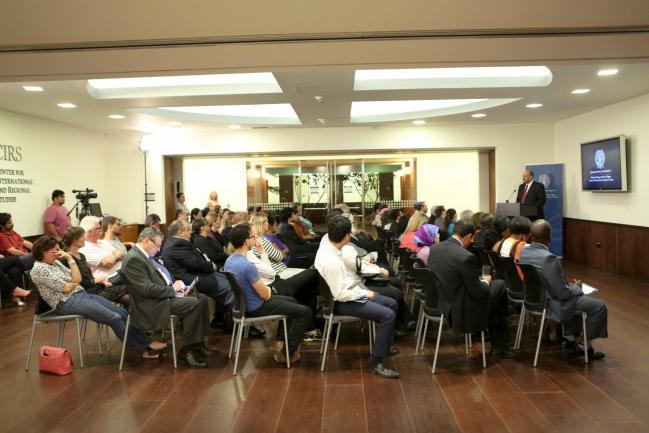Dialogue Series, Regional Studies
New Paradigms for a Palestine in Perpetual Limbo?

Sam Bahour, Managing Partner at Applied Information Management (AIM), Director at the Arab Islamic Bank and a policy adviser to the Al-Shabaka Palestinian Policy Network, delivered a CIRS Monthly Dialogue lecture on “New Paradigms for a Palestine in Perpetual Limbo,” on April 21, 2014, which centered on the persisting nature of the Israel-Palestine conflict. Bahour explained that it is not just the overt acts of Israeli violence and injustice that Palestine must overcome, but the “peace industry” itself that has been built around the problem and that paradoxically sustains the struggle even as it attempts to aid in its resolution. A solid superstructure of international NGOs, human rights organizations, advocacy groups, academic think tanks, cultural programs, and solidarity groups have been constructed around the conflict, and thrive off of its existence.
Bahour argued that Palestine is in a state of perpetual limbo because “today’s Israeli position rests on the assumption that procrastination will continue to tilt the strategic balance increasingly in Israel’s favor.” Decade by decade, he adumbrated key instances of how power relations between Israel and Palestine were incrementally and consistently skewed in favor of the Israeli state and with the backing, or indifference, of much of the international community. The Israeli occupation has ingrained ideological pathologies that do not conceptualize Palestinians as equals or as deserving of equality. “We are not facing a right-wing Israeli government. We are facing the state institution of Israel, which has embedded within it an exclusivist ideology of Zionism bent on maintaining a world view which gives preferential treatment to Jews, and is bent on redemption of the land of Israel,” Bahour explained.
Israel is reticent to reach a final settlement and to put an end to the conflict because of four perceived alternatives to a negotiated agreement—all of which are in Israel’s favor and which undermine the Palestinian position. The first is for Israel to prolong negotiations indefinitely by feigning progress even as it encroaches on Palestinian lands and rights. The second is for Israel to set up a pseudo-provisional two-state arrangement wherein a weakened Palestinian authority masquerades as a Palestinian government. The third is a unilateral separation dictated by Israel, and the fourth is for Egypt and Jordan to assume control of the occupied territories.
However, “Israeli strategic planners overestimate their own strength and underestimate the strategic opportunities available to the Palestinians,” he said, as these four Israeli-favored outcomes can be challenged by the reorientation of Palestinian strategy through four new paradigms. These include putting an end to the idea of a two-state negotiation; the reconstitution of the Palestinian authority into a more proactive entity serving Palestinian priorities; the elevation of intelligent resistance over negotiations and the reassertion of national unity through reform of the PLO and eliciting international third-party support; and the shift from a two-state solution to a bi-national or unitary democratic single state. When Palestinians finally concede to the fact that a genuine negotiated outcome is not being offered by the Israelis, they will be able to conscientiously reject the idea of a two-state solution.
Shifting to his perspective as a Palestinian parent, Bahour spoke about how his daughters perceive the future of Palestine. Although his children are aware of the total military occupation that restricts their lives, their modern and globalized attitude means that they think differently on the same issues, and have their own opinions on how the conflict should be resolved. Speaking from the perspective of the Palestinian youth generation, his daughters lamented the futility of fighting against Israel’s behemoth military and nuclear power and expressed their fatigue with decades of struggling for an international law which cannot be implemented. They opted instead to redefine Palestinian self-determination, and to come up with a radical alternative that is both unimaginable and unacceptable to the older generation of Palestinians: conceding that the Palestinians are powerless to create a viable state under the current conditions, thus surrendering the Palestinian struggle for statehood in return for their full human, civil, and political rights within the structure of the Israeli state.
“The issue of Palestine reflects a historical injustice so large and so blatant that its flame refuses to extinguish,” he argued, but this new paradigm of self-determination as envisioned by Palestinian youth turns the model of the conflict on its head and defies decades of orchestrated Israeli control with its counter-intuitive offering. Thus, Bahour concluded, the youth generation “is at a crossroads between continuing on the statehood path, which we are losing by the day […] or to drop statehood and call for civil rights.”
Sam bahour is a Palestinian-American based in Al-Bireh/Ramallah, Palestine. He is a freelance business consultant operating as Applied Information Management (AIM), specializing in business development with a niche focus on start-ups. He was instrumental in the establishment of the Palestine Telecommunications Company and the PLAZA Shopping Center, and recently completed a full term as a Board of Trustees member at Birzeit University. He serves in various capacities in several community organizations, including serving as a policy adviser to Al-Shabaka, the Palestinian Policy Network, a member of the core Local Reference Group of the Ecumenical Accompaniment Programme in Palestine and Israel (EAPPI), and co-founder of the Dalia Association. Sam writes frequently on Palestinian affairs and has been widely published. He is co-editor of HOMELAND: Oral History of Palestine and Palestinians and may be reached at sbahour@gmail.com. He blogs at www.epalestine.com.
Article by Suzi Mirgani, Manager and Editor for CIRS Publications